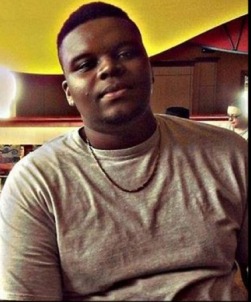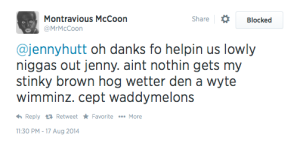If you’re paying attention to the events unfolding in Ferguson—and by God, you better be—then you probably already know there is a group of people in this country of ours who are determined to change the focus of the conversation about the murder of Mike Brown and the subsequent protests, attempting to shift the lens away from the Constitutional rights of US citizens and the murder of a black teenager. If you’re reading this, you probably already know the folks I’m talking about. But here they are. #Staywoke.
The Full-Blown Racist Troll (trigger warning)
Block on sight. Some of them are friends of your Facebook friends—block them. Some of them are your Facebook friends. Many of them are accounts like the one I have screenshotted below: anonymous and relying on blatantly racist language, such as blackface imagery, monkey references, use of the N-word, etc. These have exploded over the last week. We’re talking hundreds. I’ve been using Twitter avidly for years and I can’t recall ever seeing quite this much racist bile taking over an event-related hashtag (#Ferguson) as I have this week. Block them and report them for spam immediately.
The “Wait for Evidence” Troll
This troll may or may not be anonymous and pretends to be focused on respecting and upholding the law. “We don’t know what happened yet,” they say, “wait for evidence before you lambast an officer of the law.” They pretend that things like racism, police brutality, police corruption, etc. don’t exist and insist that if concrete evidence is released, they will be swayed to feel “sympathy” for Mike Brown. But they won’t. When evidence arises, they find objection to its relevance or veracity. They then transform into The “Mike Brown Shouldn’t Have [insert human action here]” Troll, to follow.
The “Mike Brown Shouldn’t Have [insert human action here]” Troll
This troll (and the others as well) will go great lengths to justify the taking of black life. “He shouldn’t have run,” “he shouldn’t have been sagging,” “he shouldn’t have been walking down the middle of the street,” “he shouldn’t have stolen something.” These trolls come in all races and will insist that when a police officer (or a homeowner, or a security guard) assaults a person of color, that person must have done something to deserve it. The fact that Mike Brown was shot at least 6 times doesn’t register as overkill, even when two of those shots were in the head. They will also extend effort to paint Ferguson as a ghetto, where this kind of thing happens all the time. Nope. Ferguson, Missouri had zero murders until Officer Darren Wilson killed Mike Brown.
The “Police Are the Good Guys” Troll
These folks have a blissfully naïve version of police in their heads, the one fed to them since they were children that says police are the good guys and that no matter what they do, they must have had a reason. These people have no concept—or pretend to have no concept—of the depth of white supremacy and the way it is ingrained in every facet of our culture…even our police. Because they believe the police are always right—and usually because they also believe that groups of black people are inherently violent—they have no qualms about police dressed in military gear, sitting on tanks and tear-gassing American citizens. ‘Murica. You may also hear these trolls say, “What about due process?” Well…we would proceed with due process. If they would actually arrest Darren Wilson. Which they haven’t. So…
The “Violence Just Begets More Violence” Troll
These people are the riot-shamers. They roll out the word “looters!” at every chance and are not interested in the fact that only a small number of people at the protests have actively looted, or that Ferguson protestors actually locked arms to prevent said looting. These trolls hide behind anonymous accounts, they masquerade as sane coworkers, and they work for CNN and other major media outlets. They focus on the “unrest” in Ferguson and talk about it out of context in an attempt to 1) divert attention away from the killing of an unarmed black teenager and/or 2) disguise their lack of critical thought. As Mia McKenzie of Black Girl Dangerous said so well in this post:
“a community pushing back against a murderous police force that is terrorizing them is not a ‘riot’. It’s an uprising. It’s a rebellion. It’s a community saying We can’t take this anymore. We won’t take it. It’s people who have been dehumanized to the point of rightful rage. And it happens all over the world. Uprisings and rebellions are necessary and inevitable, locally and globally. This is not to say that actual riots don’t happen. White folks riot at sporting events, for example. Riots happen. But people rising up in righteous anger and rage in the face of oppression should not be dismissed as simply a ‘riot’.”
The Concern Troll
These are among the more passive aggressive trolls you will encounter. They not only target victims like Mike Brown with statements like “I wish he hadn’t stolen those cigars: he might be alive,” but target the community as well, saying things like “Should they really be out there protesting with little kids? I worry about that kind of parenting.”
Let me make one thing clear in case you weren’t sure: these people aren’t worried about the children of Ferguson. They’re not actually “concerned” at all,” despite their title. These people employ words like “worry” and “I wish” and “concern” to communicate their disapproval of black people doing anything besides playing the Martin Baker role. If they were actually concerned, they would see the images of police with hidden badge numbers, tear-gassing eight-year old girls, and be concerned about the escalation of violence police in Ferguson are responsible for.
The “But What About Black on Black Crime!” Troll
Yes, 85% of violent crime against black people is perpetuated by other black people. But guess what? The exact same is true for violent crime committed against white people: the vast majority of those crimes are committed by other white people. People who use the term “black on black crime” either 1) work for Fox News, 2) are seeking to portray black people as violent and out of control, and/or 3) seek to portray black people as only caring about black lives when there is a way to blame white people. Let’s run that back: 1) If they work for Fox News…you already know. 2) If we’re going to make sweeping statements about people being violent and out of control, perhaps we should focus on young white males. 3) Anyone who would fit with #3 is not interested in facts, otherwise they would be aware of the vast number of organizations and movements to end gun violence in black neighborhoods…spearheaded by black people. The real motivation behind this troll (and all of them really) is to distract from the matter at hand, and that’s that an unarmed black teen is dead.
The “Don’t Make This A Racial Issue!” Troll
These are the pearl-clutchers. “This could have happened to anyone! Let’s not make this a racial issue and instead focus on getting this cop off the street!” Yes, we should focus on getting this cop off the street, but we must also focus on the conditions that made this murder possible, and that is one of racism, white supremacy, and police violence that has been being built and rebuilt since the birth of this country. No, this wouldn’t have just happened to anyone. A black male is killed by police every 28 hours in America. This is a racial issue.
These trolls will also accuse you of being racist for talking about racism and start quoting to you all the times black people perpetuated “reverse racism” against white people. Suggested action? Block and keep it moving.
The Misinformation Bots
These are particularly dangerous and I have seen a lot of them in the past week. I won’t speculate on where they come from—although I have a fairly good idea—but their sole purpose is to spread misinformation about Mike Brown and Darren Wilson, targeting people tweeting under the #Ferguson and #MikeBrown hashtags and sending them to false articles on homemade websites about alternate eyewitnesses that saw Brown attack Wilson, etc. Don’t engage with these people: they likely get paid for it. Report them as spam and, you guessed it: keep it moving.
The “I Wish We Could All Just Get Along” Troll
These trolls might mean well. They might. But that doesn’t mean they’re not trolls. You post/tweet an article and they tweet back, “This is all really bad, but I wish this wasn’t happening. Can’t we all just get along?” They’re trolling you. We all wish we could get along. But right now a boy is dead and is receiving no justice by the system that supposedly exists to protect him. Injecting Pollyanna-isms aren’t helping anyone. If you really want to help and the frontlines aren’t for you, just donate to the Michael Brown Memorial Fund. And stay out of the way.
This isn’t an exhaustive list. When a black person is killed in America, trolls come out of the woodwork in an attempt to justify or distract from the taking of that life. After finishing this post, I’m not even sure “troll” is the right word, but I’m not sure if I have a better one either. Weights, perhaps. Cinder blocks shackled to the rising tide of Americans who want better, believe in better; who see the murder of another black kid in America and say “enough.” These people are not merely trolls. “Troll” implies something harmless, a faceless entity in the underbelly of the Internet. These people are not harmless. They are part of the problem. Unfortunately I don’t have a solution for the problem they pose: they are not interested in self-education. They are not interested in empathy. They are not interested in challenging the worldview that has tucked them in at night and told them the police are here for our protection and that black people deserve what they get. They are interested only in standing very still, while the rest of us move forward. All I can say is this: move on without them. Block, report, and move on without them. Even when they’re friends.


